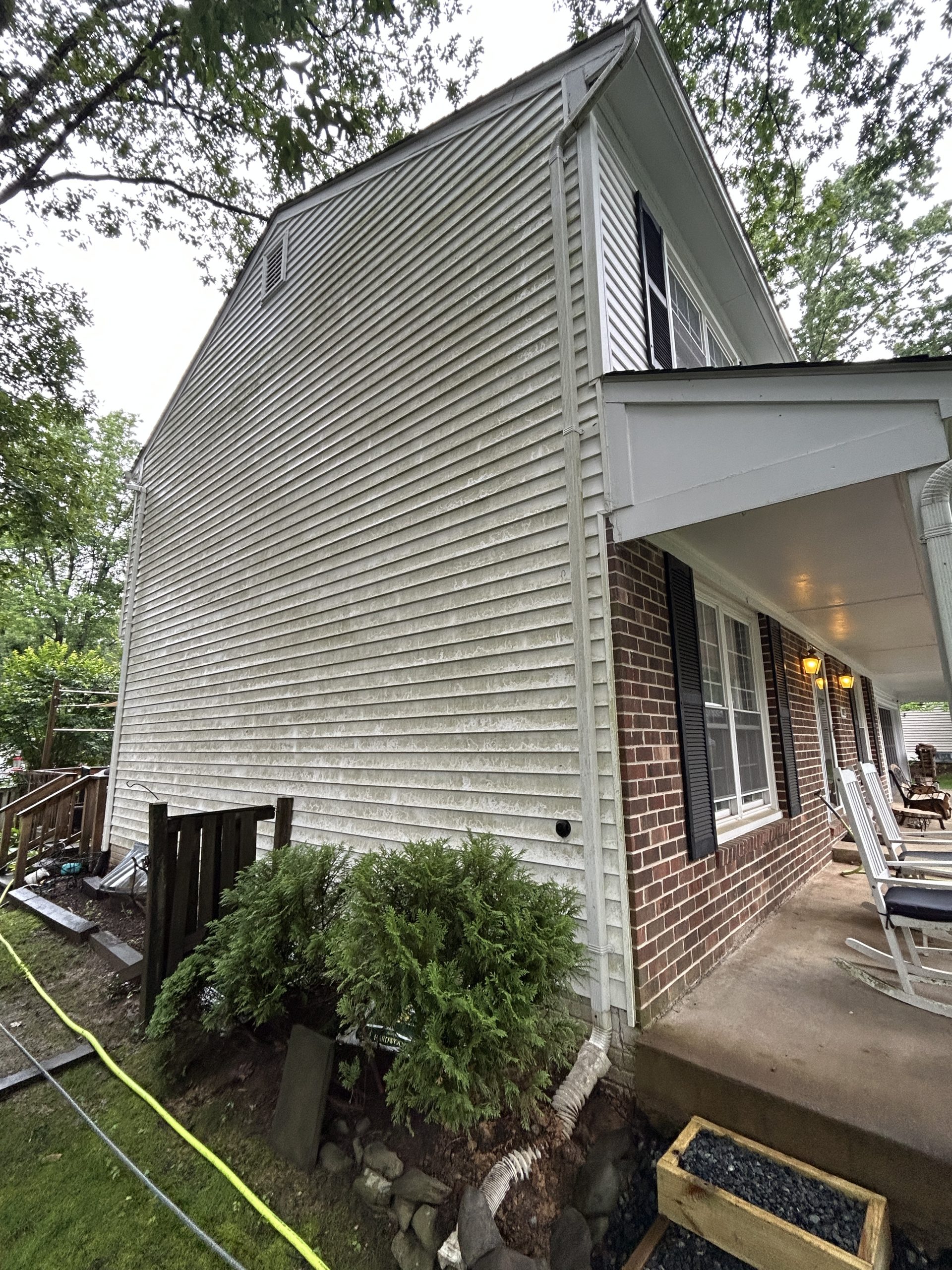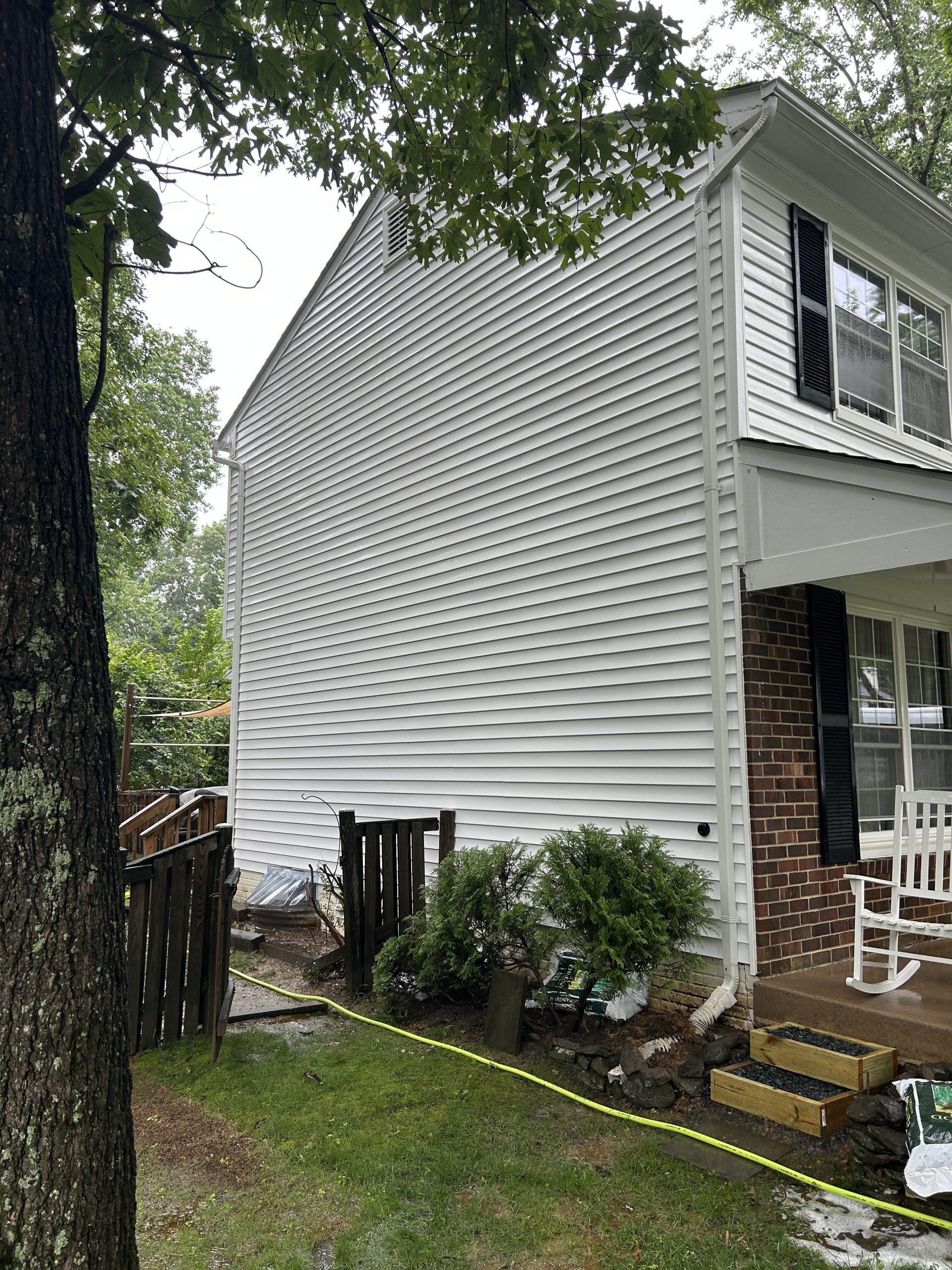How Often Should You Pressure Wash Your Home?
If you’re wondering how often you should pressure wash your home, you’re not alone. It’s one of the most common questions homeowners ask. In our experience, most homes benefit from a professional pressure washing service about once a year. That’s a good starting point for determining your home’s pressure washing frequency.
Our response is usually, “Whenever your property needs it.”
But that “once a year” rule isn’t set in stone. Where you live and how your home is positioned on your property can make a big difference. Environmental factors play a huge role in how fast grime, algae, pollen, and other contaminants build up. Let’s take a closer look at what affects how often your home needs a wash.


1. Trees and Pollen: Nature’s Sticky Coating
If your property has lots of trees nearby, you’re likely to see more buildup on your home’s siding. That’s because trees drop pollen, sap, and organic debris throughout the year. These particles stick to your home’s surface, especially when combined with humidity or rain.
Pollen doesn’t just look bad—it can trigger organic growth that clings to windows, doors, and siding. Over time, it accumulates and becomes tougher to clean. If your home is surrounded by trees, you may want to soft wash it more than once a year. Twice may be ideal, especially in spring and late fall.
2. Shade and Algae: A Sneaky Combo
Homes with a lot of shade tend to attract algae and mildew. Without direct sunlight to dry surfaces, damp areas stay wet longer. This creates a perfect environment for algae and mildew to thrive.
You might notice green streaks on the north side of your house, under roof overhangs, or behind bushes. These growths don’t just hurt your home’s appearance—they can slowly damage your home’s siding or roof if left untreated.
If your home is often shaded or stays damp for long periods, annual cleaning may not be enough. Homeowners often ask how often to pressure wash a house in these situations—sometimes twice a year is better to prevent unsightly buildup.
3. Busy Roads = More Dust and Pollution
Is your home near a main road, highway, or high-traffic street? If so, you’re likely getting more dust and airborne pollution than homes tucked away in quiet neighborhoods.
Car exhaust, brake dust, and road grit settle on your home, making it look dull and dirty. These particles can also contribute to long-term staining. If you notice a film of grime on your windows or siding just days after cleaning, it’s a clear sign your house is exposed to heavy fallout.
For homes near busy roads, pressure washing once or twice a year helps prevent buildup and keeps your home looking sharp.
4. Gardens and Insects: Pretty but Problematic
Lush gardens and flower beds look beautiful, but they can bring a surprising side effect: bugs. Dense shrubs, mulch, and flowers attract insects that leave behind webs, nests, droppings, and other messes. Over time, these contribute to the grime on your siding.
Spider webs, in particular, love to hang out in corners, around windows, and behind outdoor lights. These webs trap pollen and dust, making your home look unkempt.
If you’re an avid gardener or have landscaping close to your home’s walls, plan to pressure wash more frequently. This helps remove webs, droppings, and insect buildup on siding while protecting your exterior from stains and damage.
5. Seasonal Weather: Another Key Factor
Some regions get more rain, humidity, or wind than others. These conditions also affect how fast dirt, mold, and algae develop. For example:
- Humid climates promote mildew and algae growth.
- Windy areas blow in dust and sand that can cake onto siding.
- Rainy seasons can splash mud and grime higher than you’d expect.
If your area experiences extreme seasons, consider adjusting your cleaning schedule. You might benefit from an early spring wash to clear winter residue and a fall cleaning to prep for colder weather. In many climates, sticking to an annual house washing schedule works best.
6. Home Siding Material Matters Too
The type of siding your home is constructed with will affect how often it needs pressure washing:
- Vinyl siding tends to show dirt and algae more easily.
- Stucco can hold onto dust and mildew in its textured surface.
- Brick is sturdy but can collect soot and moss in damp areas.
- Wood siding requires care to avoid long-term rot and mildew buildup.
No matter the material, pressure washing helps preserve the integrity and look of your siding. Just make sure you use the correct pressure settings or hire a pro to avoid damage.
7. HOA Rules and Neighborhood Expectations
If you live in a neighborhood with a homeowner’s association (HOA), they might have cleanliness standards or appearance rules. Some HOAs even require annual pressure washing to maintain a uniform look.
Beyond the rules, keeping your home clean helps maintain property values in your neighborhood. It also shows that you take pride in your space, which your neighbors (and potential buyers) will notice.
It is important to note the pedestrian walkways and common areas that are cleaned frequently are also much safer. Nobody wants to worry about slipping and falling while walking on slippery algae on a sidewalk. Regular maintenance helps maintain that coefficient of friction—the technical safety term for the level of “grip” surfaces provide.
Final Thoughts: What’s Right for Your Home?
While “once a year” is a solid starting point, your home may need more frequent cleaning depending on:
- Nearby trees and pollen levels
- Shade and moisture exposure
- Proximity to busy roads
- Landscaping features
- Local weather conditions
- HOA guidelines
The best approach? Walk around your home every few months. Look for signs like dirt streaks, green patches, cobwebs, or faded siding. If your siding looks dirty, it probably needs a wash.
Sticking to a regular pressure washing schedule is one of the easiest ways to keep up with home exterior cleaning and extend the life of your siding. If you’re unsure what your home needs, contact Pro Exterior Wash Plus for a free assessment and proposal tailored to your property.

